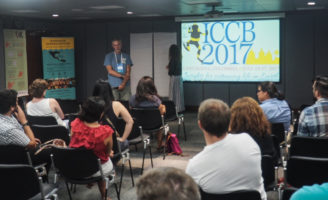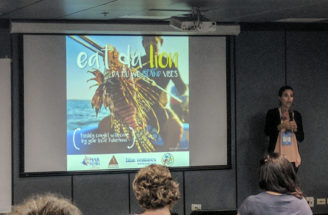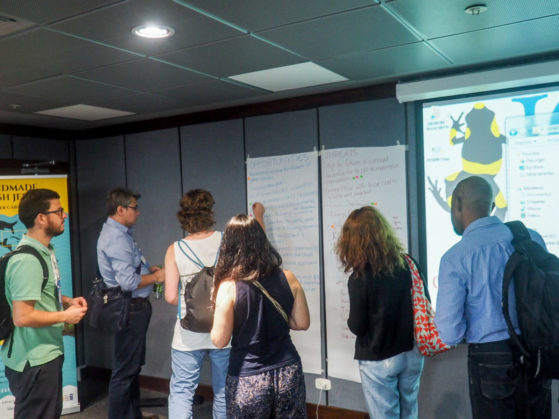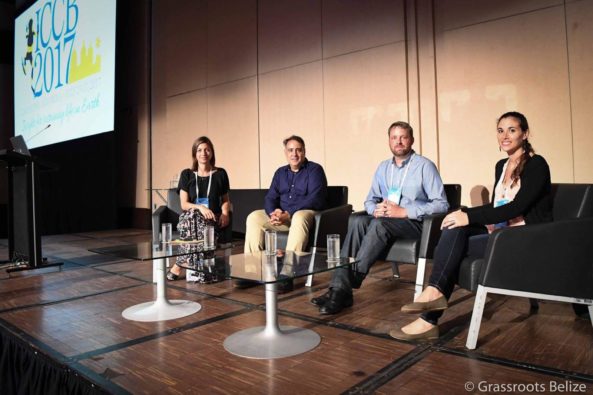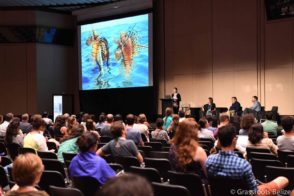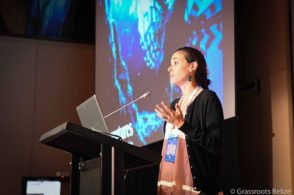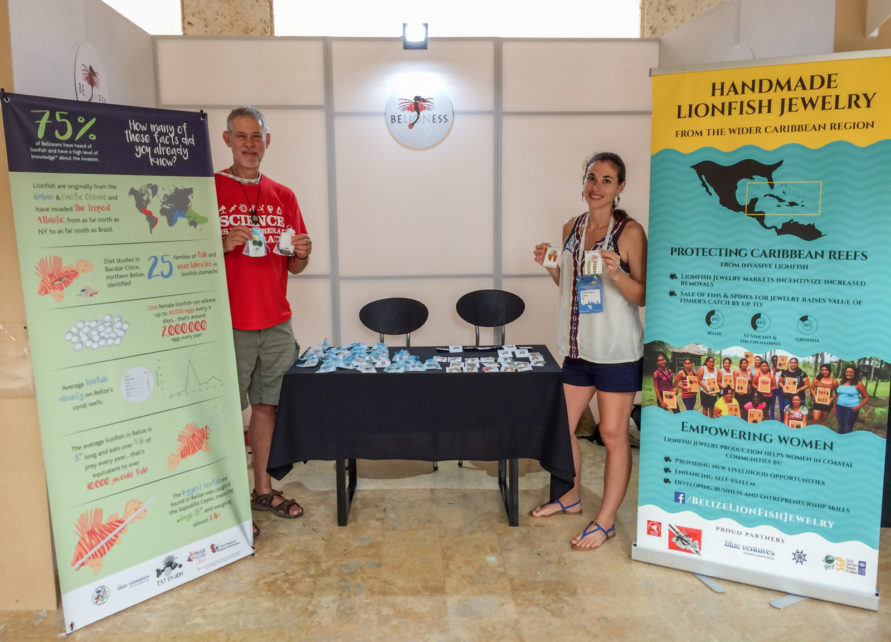Last month, I attended the 28th International Congress for Conservation Biology (ICCB) in Cartagena, Colombia. I was at the conference to host a workshop about invasive lionfish management, present on our mobile monitoring during a symposium about new technologies in conservation, as well as participate in a panel about environmental entrepreneurship. Throughout the conference, we also hosted a booth – sponsored by Lionfish University – selling lionfish jewellery made by Belioness and Kaj Expressions.
The thing that really struck me during the conference was the collective recognition that conservationists (both academics and practitioners alike) need to have a wide range of interdisciplinary skills to address the complex problems that the sector faces. In this blog I try to distil what I heard, experienced and thought at ICCB into four “take home messages” on this subject.
#1: study history and politics
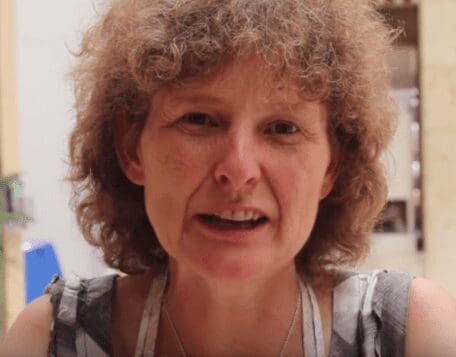
Professor EJ Milner-Gulland summarises her thoughts in this short interview.
A turbulent global political climate means that support for conservation is less certain than ever before – however this does not provide us with any reason to be pessimistic. ICCB symposia and workshops demonstrated that conservationists have risen to the challenge, and creative solutions designed to be financially sustainable abound. As highlighted by Professor EJ Milner-Gulland during her plenary talk about conservation optimism, the most promising solutions take into account historical, political and modern social contexts.
#2: don’t be a technophobe!
The symposium about new technologies in conservation, organised by researchers at the Auckland University of Technology, was a great example of this. Presentations ranged from the potential use of Pokemon Go to increase engagement in conservation in urban settings, to the use of conservation drones for improved monitoring of remote or fragile sites. On Tori’s behalf, I presented as part of this session, and described our journey using smartphones to monitor Madagascar’s shark fisheries, as well as the ODK Toolkit – a detailed how-to guide for partners interested in establishing their own community mobile monitoring programme.
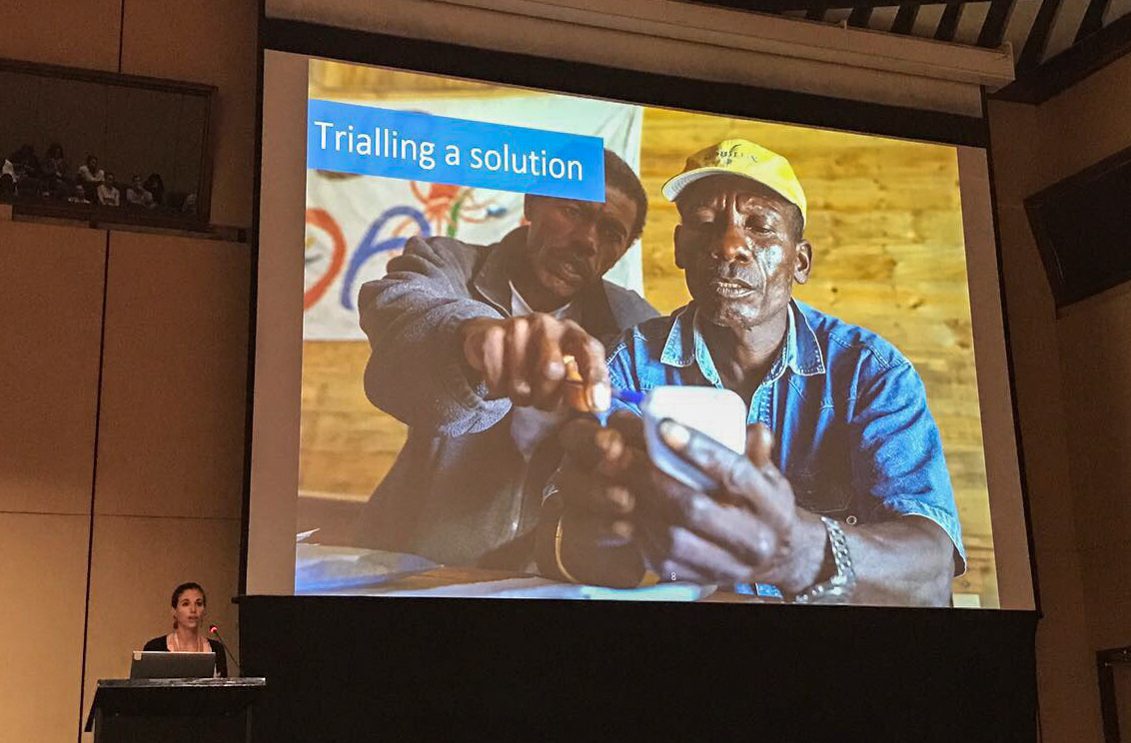
Jen presenting on Blue Ventures’ journey using smartphones to monitor Madagascar’s shark fisheries | Photo: Ruben Venegas
#3: social impacts of declining biodiversity and conservation activities are complex and difficult to predict. Don’t shy away from the challenge.
I was also extremely interested by a presentation by Victoria Griffiths about the inclusion of social well-being indicators for biodiversity offsets, which I first learned about through my Kinship fellowship in 2014. Biodiversity offsetting is a mechanism whereby developers invest in biodiversity conservation to “offset” unavoidable impacts to biodiversity. Unsurprisingly, biodiversity offsets are controversial; while they force developers to consider and minimise biodiversity impacts, our ability to predict biodiversity impacts and effectively carry out avoidance or restoration is limited. This becomes more difficult when considering the value of biodiversity to people affected by major developments, which is often subjective and relational, and whose perspectives are almost always excluded. It is extremely encouraging to see efforts to include social well-being measures, as to do so is a critical step towards more socially and environmentally responsible development.
Learning about the ‘no net loss’ approach taken for biodiversity offsets inspired me when strategizing for integrated lionfish management in Belize (read more in our recent factsheet). We have adopted a Coupled Human and Natural Systems approach to lionfish management planning, which aims to leverage efforts for lionfish control (keeping this idea of “no net loss” to biodiversity as a central pillar to the strategy) to deliver additional socioeconomic benefits to fishing communities e.g. through the development of markets for invasive lionfish.
During ICCB, we also hosted a workshop (you can watch a recording here) that discussed the relative risks and opportunities surrounding these human-centred approaches to lionfish control. I believe that through thoroughly considering all potential outcomes, we have the best chance at delivering positive impacts to people and biodiversity in Belize.
#4: people love lionfish jewellery <3
I had the opportunity to discuss my favourite example of a market-based intervention (Belioness – Belize Lionfish Jewelry) whilst participating in a panel about environmental entrepreneurship, alongside Dr Alex Dehgan, CEO and founder of Conservation X Labs (an innovative tech-for-conservation startup) and Chris Wood, the founder of eBird – arguably the most successful citizen science programme to date. During the panel, we discussed the need not only for businesses to do better at integrating environmental goals to their work, but also for conservationists to better understand markets and business.
This is particularly true when I consider our support for Belioness. In 2015, following a series of workshops, Blue Ventures helped establish this independent business, with membership made up of women from seven of Belize’s fishing communities. The business is owned completely by its members, with Blue Ventures providing support for its day-to-day management.
Visitors to the lionfish jewellery booth, sponsored by Lionfish University, were taken by the group’s story, and over 100 pieces were sold throughout the conference. Those who had seen Belioness’ jewellery before noted that the quality had improved, extremely welcome feedback, as this has been a major focus for the last year.
Overall, ICCB was an action-packed and busy week – only made possible thanks to our wonderful partners in lionfish work, and in particular Jen Solomon, Steph Green, Phil Karp and Fadilah Ali. I look forward to working through outputs of the workshop, and exploring ideas that came out of the countless interesting conversations and contacts made… watch this space!


